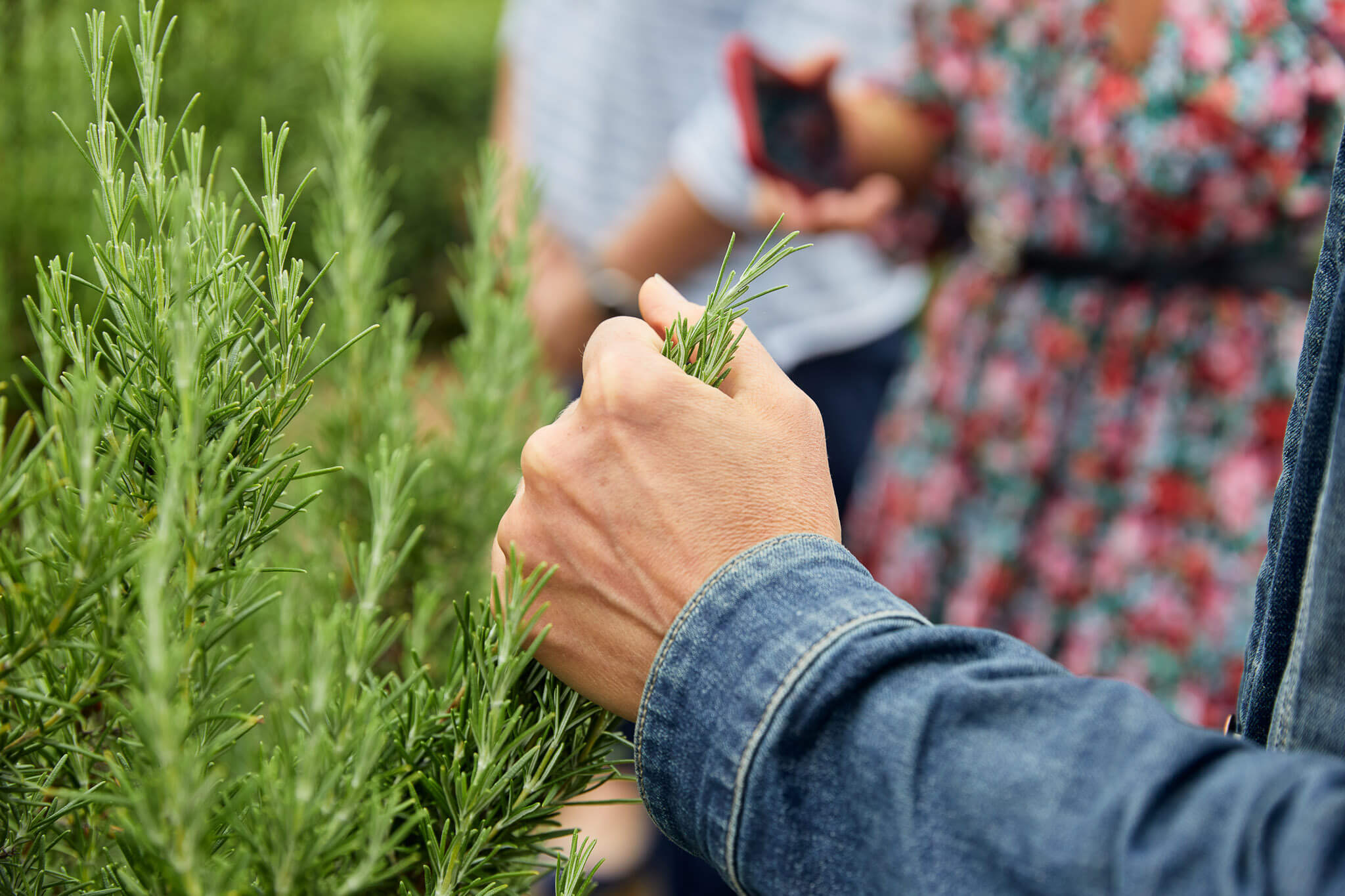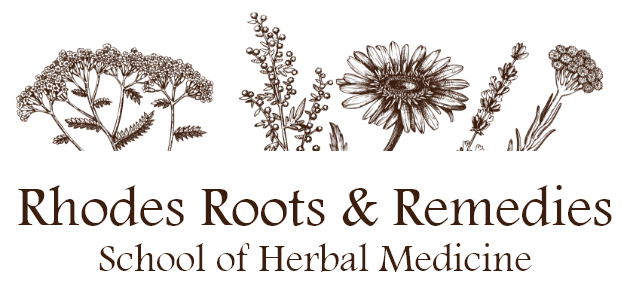When you first start learning herbalism, it can be incredibly tempting to try to learn 100 medicinal plants and their uses all at once and as fast as possible. With all the wonder of plant medicine to explore, of course it’s exciting! You may even feel like you need to play catch up on the thousands of years of natural medicine knowledge you’ve been missing out on. I felt the same when I began my journey. But many years of building my relationship with the plants later and having qualified as a clinical herbalist, I have a few pieces of advice that I hope will help you on your path.

1. Learning 100 medicinal plants and their uses at once is overwhelming.
Even the sharpest of minds will get overwhelmed trying to remember all the Latin names, the herbal actions, the chemical constituents, safety, contraindications and so on. Remember, working with medicinal plants is a knowledge and skill set that is as old as the dawn of time. There is a LOT to learn, but no need to get overwhelmed. It may seem too small scale or not fast or exciting enough to focus on one herb at a time, but after many years of experience both learning and teaching herbal medicine, slow and steady definitely wins the race.
2. You’ll end up knowing one use for many herbs, rather than many uses for one herb.
Speak to any reputable herbalist who’s been practising for a while, and we’ll all tell you the same thing - we have a core set of 20ish herbs we work with regularly and consistently. How can we do that in the face of over 100 medicinal plants and their uses, not to mention the incredible breadth and complexity of the human experience and what we’re called to support with herbs? We can do it because our knowledge of each medicinal plant is deep, nuanced and rich. We know each herb like an old friend, so we know who’s best to call on for support in a particular situation, as well as who can be of help when perhaps our top choice is out of season or we’ve run out. When you study herbal medicine, you’ll see many plants referred to as ‘panacea’ herbs, meaning they were considered ‘cure alls’ by ancient civilisations. That’s not because they didn’t have as much information as we do about health, illness, disease, etc. Rather, it’s because they had deep knowledge about each plant - and had to, as they only had access to what was readily available in their local environment. Knowing one herb really well easily replaces very top-level knowledge about ten herbs.
3. Memorising is not the same as knowing.
Memorisation utilises certain parts of the brain, and there’s nothing wrong with that. Some of us have developed a lot of skill in this area and have learned how to ‘learn’ very quickly. But this isn’t the same as knowing something in your bones, in the very fibre of your being, in the deeper recesses of your brain - the parts where knowledge enters and never leaves. Instead of thinking your goal is learning 100 medicinal plants and their uses, reframe your goal as remembering and relearning. The knowledge of medicinal herbs and how to work with them to support our health is baked in your bones. It’s been passed down through our human ancestors for thousands of generations. This knowledge runs deep. When you get out of manic memorisation mode and into working through your senses, you’ll find the knowledge springs up to the surface and sticks.
4. Learning 100 medicinal plants and their uses at once is expensive.
Learning 100 medicinal plants and their uses at once is expensive in more ways than one. It’s expensive in time, because you’ll spend lots of time cross-referencing lots of books (not to mention buying lots of books, although I’ll admit this is fairly impossible to resist!), making flash cards, drawing reference tables and charts. It’s expensive in space, because all those books and all those herbs and all those notebooks have to go somewhere! When I first started learning herbalism in earnest, I was cramming herbal things into every nook and cranny of a tiny one bedroom London flat. Yes, I even had tincture bottles under the bed! It’s also expensive in terms of pure money. You’ll find yourself buying lots of dried herbs to experiment with - many of which will go off before you really get to them. You’ll buy lots of books (even second hand ones add up!). You may even find yourself signing up to lots of little seemingly inexpensive online on-demand herbalism courses, which can also add up quickly and often either don’t get completed or deliver the real learning you’re craving. You can absolutely spend your time, space and money more efficiently and get much more value for it!
5. You’ll miss the joy.
Learning herbalism is exhilarating, inspiring and incredibly empowering, but if you’re in a rush to cram it all into your head at once, you’ll miss the joy. Genuinely, stopping and smelling the roses is part of getting to know the medicinal properties of roses! Give yourself space to be curious, to explore, to listen to how your body responds to the herbs you’re getting to know. Give yourself time to go down a really fascinating rabbit hole and see where it leads. Let learning be an adventure, a journey, a winding path, rather than a hardcore textbook session that’ll leave you burnt out and uninspired instead of feeling alive and powerful.
I know it’s hard not to dive headlong into all the incredible things to discover within herbal medicine, but as a qualified herbalist and herbal medicine teacher, I can guarantee you rushing to memorise 100 medicinal plants and their uses is not the way to truly learn and ultimately live herbal medicine. You’ll get overwhelmed. Your understanding of the plants will lack depth. You’ll memorise information, but you’ll lack knowledge. You’ll waste time, money and space. And, perhaps the biggest loss - you’ll miss the joy. So take things one step at a time - one herb, one book, one course. You’ll start developing knowledge you can actually use, rather than give yourself a headache!
And if you’re here in the UK, you’re very welcome to take the next step on your journey learning herbal medicine with us on our intensive herbalism course - Awaken Herbal Wisdom - which spans all four seasons and gets herbalism both deep into your bones and your daily life. Although it is intense - which may be what you’re craving if you’re reading this article - it gives you the time, space and guidance to learn herbal medicine with depth, practicality and inspiration. We’re not rushing - we’re focusing. You can learn more about our herbal medicine course here. Be sure to put your name on the waiting list to see what the current cohorts are up to and get first access to enrolment before it opens.
However you choose to take your time gradually building your knowledge of 100 medicinal plants and their uses as your herbal studies unfold, I hope you enjoy the journey!
At Rhodes Roots & Remedies School of Herbal Medicine, our practice of herbalism is rooted in the belief that we must remember, reclaim and relearn our knowledge of our bodies, our autonomy and how to work with plant medicine in order to bring control of our own health back into our families and homes for a sustainable future for ourselves and the planet. Through our intensive herbalism course, we facilitate the development of confident, empowered herbalists, attuned to the messages of their bodies and the natural world. Living the deep wisdom of herbal medicine within themselves, their homes and their communities, they uplift themselves and others, creating a stronger society organically. We do hope you'll join us on your journey!

